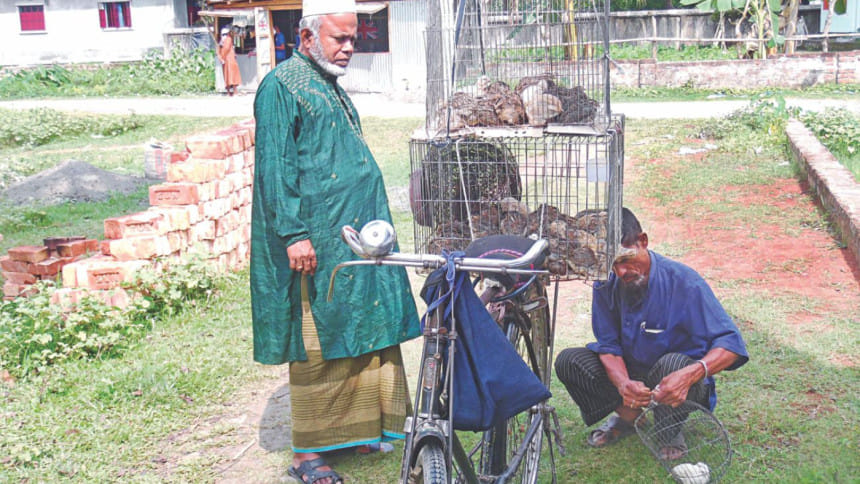Barisal's quail trade improves the lot of the poor

Each day Mokhlesur Rahman rides his bicycle 15 kilometres from his Bakerganj home to Barisal City's Rupatali in pursuit of his newfound livelihood. Now in his 50s, Mokhlesur used to be a day labourer, dependent upon others for his income, not knowing day-to-day if he would be hired or not. In the streets of Rupatali he found a better option. He discovered the quail trade.
Banking on the rising popularity of quail meat and eggs in different areas of Barisal division, Mokhlesur buys his birds from local poultry farmers for Tk 40 to Tk 60 each. Selling door to door in Rupatali, he can realise a retail price of Tk 50 to Tk 70 per bird.
"In a day I can sell up to 60 birds," says Mokhlesur, "It gives me an income of around Tk 500 per day." He finds quail are popular with struggling and well-to-do households alike; and by way of additional incentive Mokhlesur offers a free bird cage to anybody purchasing two or more birds.
While Mokhlesur's income might sound modest, as he cycles home of an evening with empty cages attached to the back of his bicycle, he is happy. "It used to be that some days I could not buy food for my family," he recalls, "but in running my quail business I can manage everything I need." In meeting his daily expenses, the quail business has made Mokhlesur financially independent.
And he is not alone. "There are about 100 others running the same type of business," Mokhlesur says. In the struggle among the poorest for independent solvency, the Barisal quail trade is proving a reliable ally.
Another advantage of selling quail according to Mokhlesur is that it does not require substantial capital to start. "The farm owners give me the birds in the morning to sell, and they take their purchase price in the evening after the birds are sold," he explains.
"But if I had Tk 20,000 to use for capital, even if it was as a loan, I could make more profit and be even more independent," he adds.
Yet even without additional capital the quail trade has changed the lives of Mokhlesur and his family. Whereas his son used to work because the family couldn't manage well without his supplementary income, selling quail has allowed Mokhlesur to arrange for his son to study instead.

 For all latest news, follow The Daily Star's Google News channel.
For all latest news, follow The Daily Star's Google News channel. 



Comments